Islets in Halong Bay: A Tranquil Escape into Vietnam’s Scenic Waters
Halong Bay is a UNESCO World Heritage Site thanks in large part to its emerald seas and imposing limestone islands. The many islets that dot this bay’s waters, each with their own special appeal and mystery, really distinguishes this bay from others around coastlines. From the well-known islands to understated treasures, we will explore the beauty and mystery of the islets in Halong Bay in this MOTOGO Tours article.
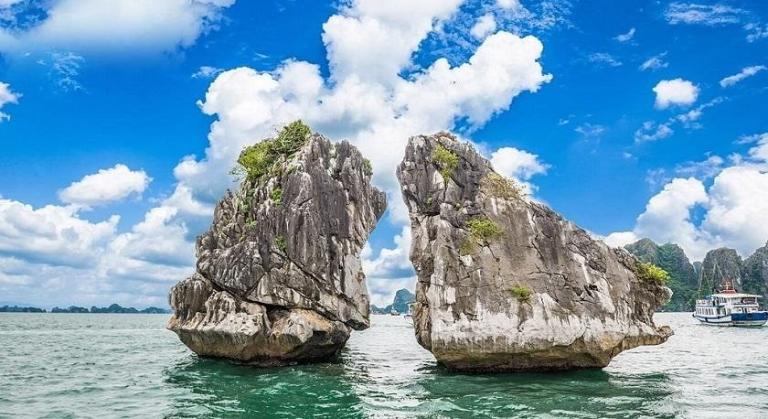
What Makes Halong Bay Unique?
Overview of Halong Bay’s Geography
Covering more than 1,553 square kilometers, Halong Bay boasts almost 1,600 islets, most of which are limestone-based. These rocky outcrops range in form, scale, and use. Certain are utterly desolate, while others are covered in rich vegetation. Their formation accentuates the mystery and appeal of Halong Bay; they are evidence of the geological processes that have sculpted the area over millions of years.

The UNESCO World Heritage Status
Halong Bay was named a World Heritage Site and acknowledged by UNESCO in 1994 for its universal importance. The bay is well-known for its historical significance, great natural beauty, and great richness of species. Halong Bay’s appeal has increased even more thanks to this awareness; millions of people travel year to see its limestone structures and islets.

Understanding the Islets in Halong Bay
What Are Islets in Halong Bay?
Usually rocky and uninhabited, islands known as islets dot the seas of Halong Bay. Rising steeply from the surface of the lake, these islets—formed millions of years ago—form an amazing scene with great calm and beauty. They are essential for the ecology of Halong Bay since they provide an abundance of activities for guests and support several kinds of animals.

Formation of the Islets: Nature’s Masterpiece
Halong Bay’s islets developed by means of a confluence of natural elements. The limestone mountains have been worn down over millions of years by erosion and weathering, producing these spectacular and beautiful structures. During the Holocene, the water level rise buried the land and left behind the prominent peaks that define Halong Bay today.

Famous Islets in Halong Bay
More than 1,600 islands and islets abound in Halong Bay, each with individual appeal and shape. These islands are stories just waiting to be found, not only physical objects. Let’s explore some of Halong Bay’s most well-known and strikingly beautiful islets closer-up.
1. Trong Mai Islet (The Kissing Cocks Islet)
A pair of towering limestone boulders that resemble two cocks facing each other define maybe one of the most famous pictures of Halong Bay, Trong Mai Islet, sometimes known as The Kissing Cocks Islet. According to legend, the gods turned once ferocious competitors, two cocks, to stone following a war.

These days, they represent love, loyalty, and the harmonious coexistence of nature as well as Photographers regularly catch the picture of the Kissing Cocks islet, which is then frequently utilized as Halong Bay’s natural beauty’s emblem.
2. Dinh Huong Islet (The Incense Burner Islet)
Halong Bay also boasts another well-known site called Dinh Huong Islet, sometimes known as The Incense Burner. This islet is notable for its unusual form, which mimics a classic incense burner seen in many Vietnamese religious events. Rising sharply from the sea, it has a little flat platform at top. This islet looks calm and peaceful thanks in part to its incense burner form.
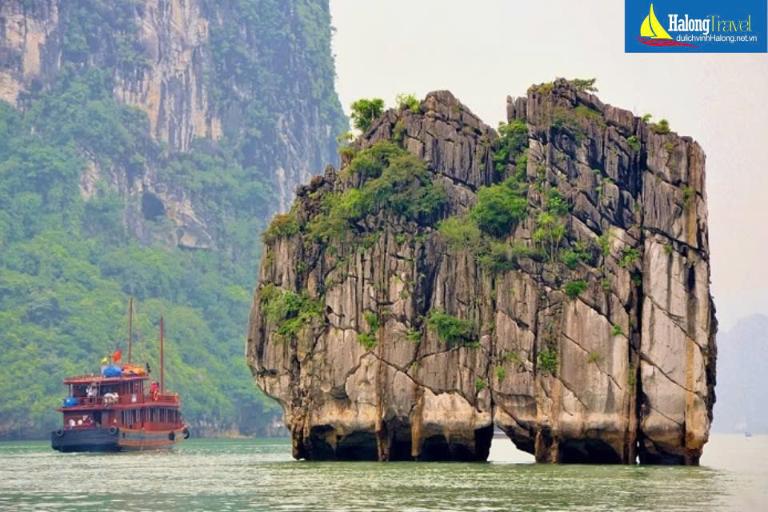
Often considered as an emblem of the spiritual life of the Vietnamese people, it is among the most photographed islands in the harbor. One of the most identifiable structures, the islet lies close to Halong Bay’s entrance.
3. Mat Quy Islet (Monster Head Islet)
Dramatic limestone formation Mat Quy Islet, sometimes known as Monster Head Islet, resembles the head of a monstrous monster rising from the sea quite precisely. Those looking for an exciting and enigmatic touring experience will find the islet a favorite since of its terrifying and intriguing look. Photographers who frequently use shadows and light to accentuate the spooky appearance of the islet love working on this subject.
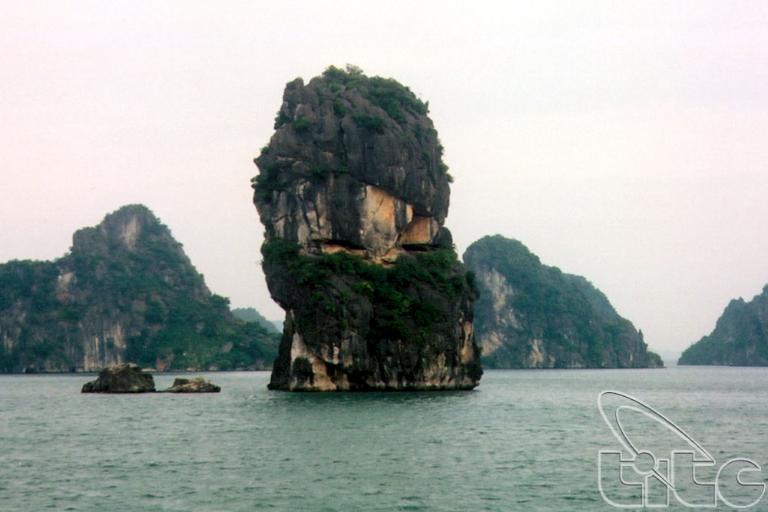
4. Dau Nguoi Islet (Human Head Shaped Islet)
Another well-liked rock feature in Halong Bay is the Human Head-shaped Islet, Dau Nguoi. Reflecting its name, it has clear characteristics like eyes, a nose, and a mouth, and a human head shape.
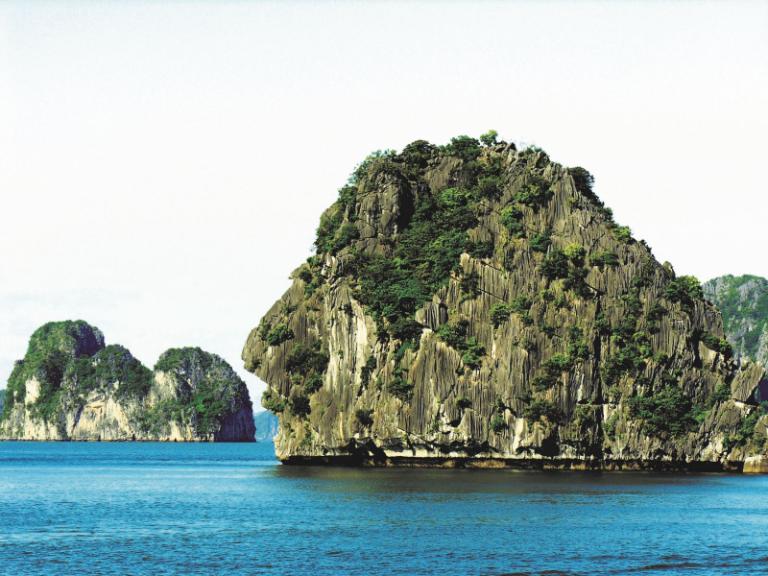
Dau Nguoi has a remarkable story, much as many of the islets in Halong Bay. Some claim it’s the head of a giant once prowling the earth. The islet’s sharp, angular characteristics that resemble a human face naturally inspire the imagination. Its arresting looks accentuates the bay’s mysterious ambiance.
5. Cho Da Islet
Dog Stone Islet, sometimes Cho Da Islet, got its name from its resemblance to a dog sleeping on its side. The islet has an extended form with a notable rock feature like the head and body of a dog. Cho Da Islet is charming because of its simplicity and its dignity among the calm waves of Halong Bay. Its unusual and charming form attracts tourists even although it is smaller than other well-known islets.
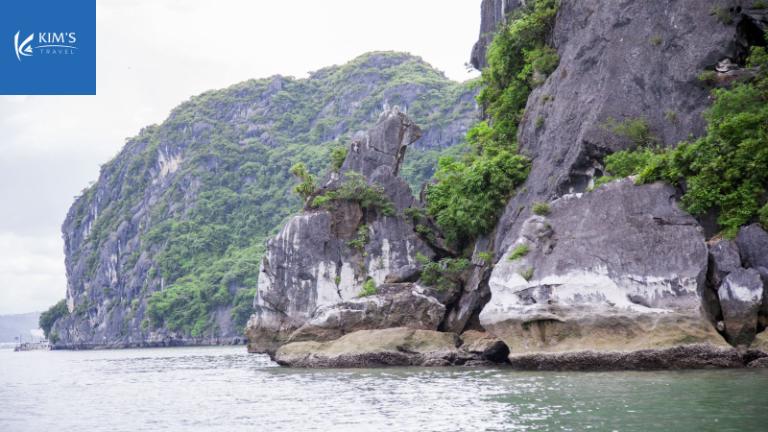
6. Con Coc Islet (Toad Islet)
Another distinctively shaped island in Halong Bay is Con Coc Islet, sometimes known as Toad Islet. It assumes the form of a toad seated on a rock, with its back arched and its eyes obviously visible. Con Coc Islet’s legend is a local one whereby the gods turned a gigantic toad into stone.
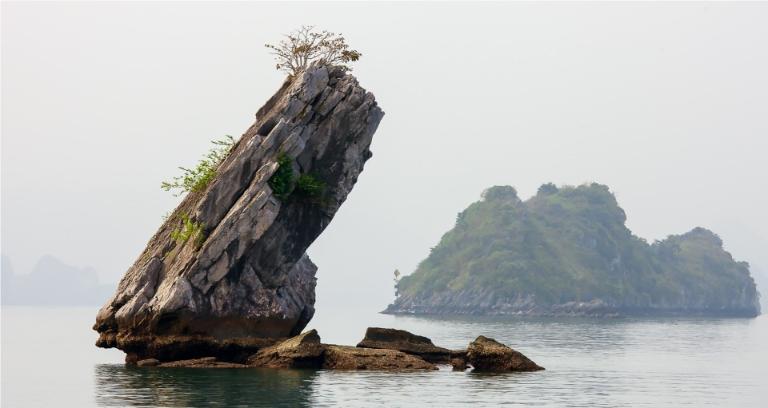
The islet is most well-known for its appearance at dawn, when the sun gives its surface an ethereal glow that gives it almost living impression. Halong Bay trips frequently feature this islet since of its interesting form and recreational value.
7. Oan Islet
Although one of the smaller, less well-known islets in Halong Bay, Oan Islet nonetheless exudes mystique. Named in Vietnamese as “fate,” or “sorrow,” the islet is fashioned like a finger pointing upward.
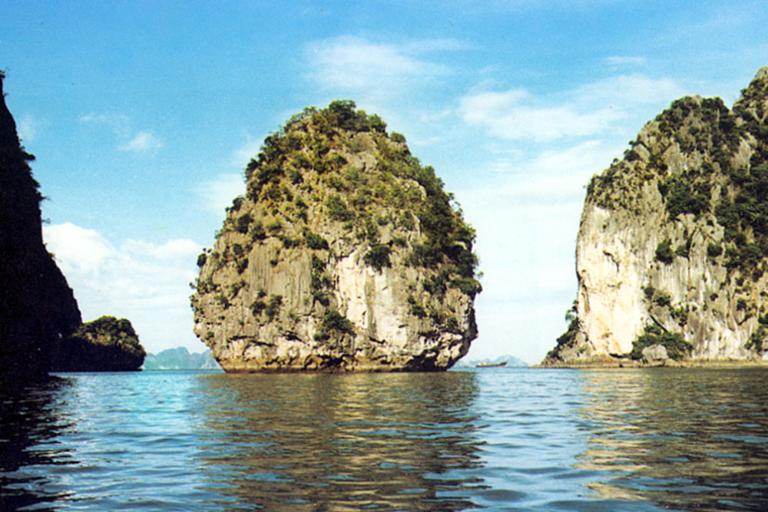
Local mythology has the islet connected to a sad love tale. According to the narrative, fate split a couple whose love was forbidden. The islet is thought to be the location where their souls dwell, always joined in stone form. Though it is not as well-known as some of the other islets, it is nevertheless a lovely site to behold with own appeal.
8. Ngon Cai Islet (Thumb Islet)
Stunning rock structure Ngon Cai Islet, sometimes known as Thumb Islet, looks like a thumb emerging out of the sea. Against the breathtaking panorama of Halong Bay, the tall and slender islet draws attention. Usually featured on most Halong Bay cruise schedules, this is one of the most identifiable islands in the bay because of its odd form.
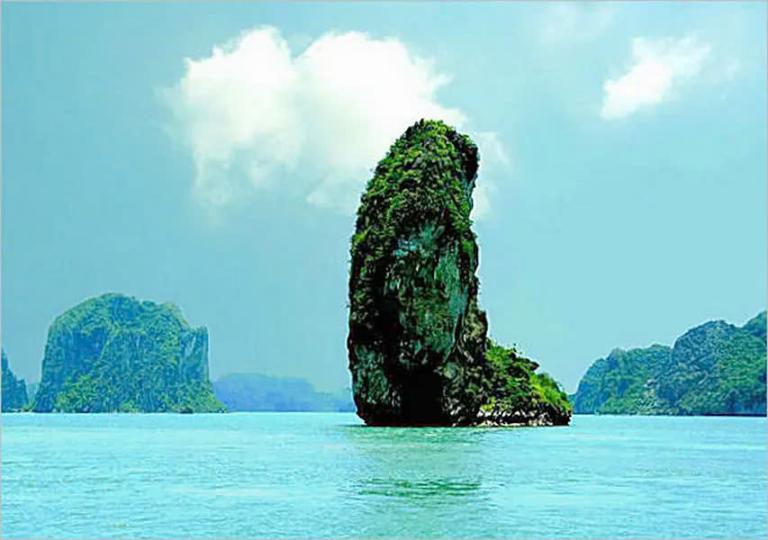
9. Am Islet
Situated in the middle of Halong Bay, Am Islet, sometimes known as Am Islet (really “Womb Islet” in Vietnamese), is a little yet interesting island. The form of the islet, which reflects a womb or a cave opening and hence represents the birth of life, determines its name.
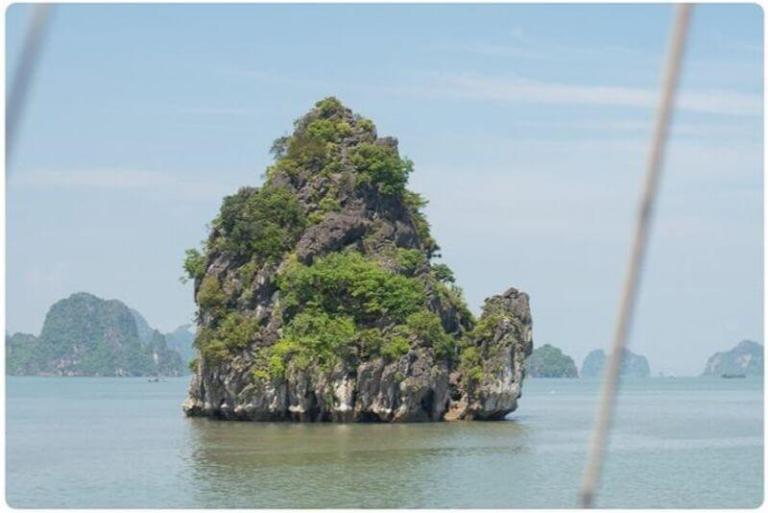
Often sought after by visitors wishing to savor Halong Bay’s unspoiled splendor, this is a peaceful and quiet area. Clear seas and rich vegetation surround Am Islet, which has a distinctive form among the several geological beauties in the area. It’s a great place for nature photos and introspection.
10. Dau Moi Islet (New Head Islet)
Near the southeast of Halong Bay sits Dau Moi Islet, sometimes known as New Head Islet. Though having a more angular and modern look, this islet is well-known for its strong and grand form, which is supposed to reflect a human head.

The islet’s likeness to a newly-formed head with sharp features that seem to be always developing from the sea gives the name “New Head” significance. At daybreak, when the golden light creates long shadows on the rock formations, Dau Moi Islet is very remarkable and accentuates its enigmatic and grandeur.
11. Su Tu Bien Islet
Halong Bay also boasts another famous island called Su Tu Bien Islet, sometimes known as Lion Islet. This islet resembles a lion, as the name implies; its head and mane are obviously seen above the sea. Often creating the impression of a lion defending the sea, this islet stands boldly amid the glittering bay waters.
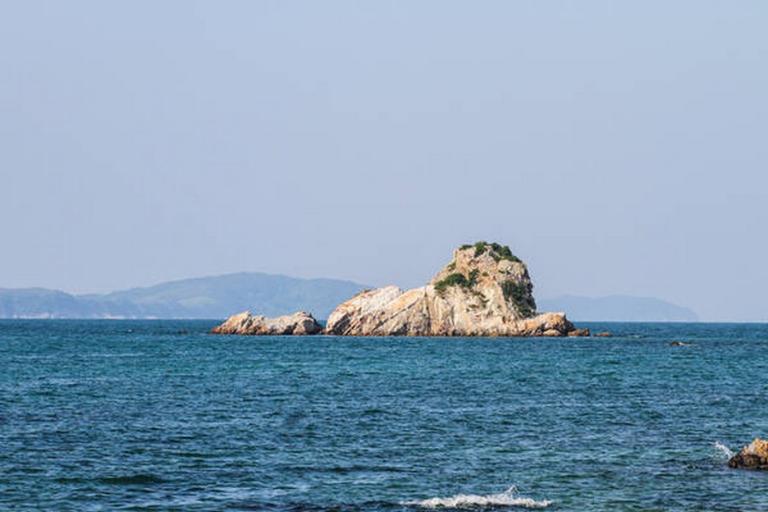
Legend has it that the lion was originally a strong animal who assisted in area protection but over time the gods turned it into stone. One of the most aesthetically pleasing islets in the bay, Su Tu Bien islet is also among the most unforgettable sites for visitors due of its animal-like form.
12. Xep Islet
Hidden jewel in Halong Bay, Xep Islet is well-known for its peaceful beauty and unusual scene. Jagged limestone rocks and a peaceful surroundings define this little island. For those who value the untamed side of nature, Xep Islet is an interesting location since its rocky cliffs climb sharply from the sea.
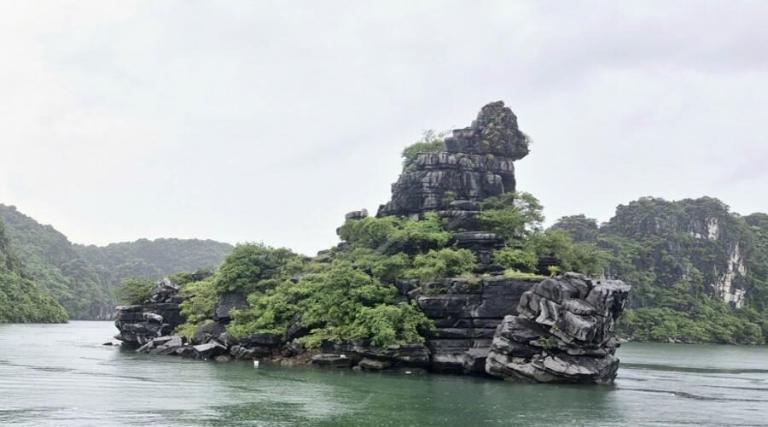
Xep Islet is not connected to any particular mythology unlike other of the more well-known islets, but its natural beauty and serene surroundings make it a necessary component of the Halong Bay trip. Visitors could kayak or just enjoy the scenery from a boat.
Activities Around the Islets in Halong Bay
Kayaking and Swimming Among the Islets
Kayaking is among the greatest ways to see the islets of Halong Bay. It is a strange sensation to paddle across the still waters separating the tall limestone cliffs. Kayaking allows you to go up close to Halong Bay’s natural splendor whether your trip is one of exploration of cavernues, beach visits, or just appreciation of scenery.

Island-Hopping and Cruises in Halong Bay
Cruising Halong Bay is another well-liked approach to visit the islets. Many tour companies provide island-hopping trips that carry guests to some of the most famous islets and secret treasures. A leisurely approach to appreciate the breathtaking surroundings while savoring the comfort of a boat is by cruise.

The islets in Halong Bay provide guests with an opportunity to discover some of Vietnam’s most exquisite and peaceful settings, so attesting to the might of nature. Halong Bay’s islets offer a singular and wonderful experience whether your trip is kayaking through caverns, climbing to a panoramic viewpoint, or just savoring the peace of the islands.










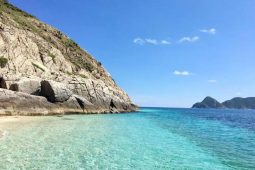

Be the first to comment!